VIPsight - November 2010
COMPANIS
Hochtief versus ACS
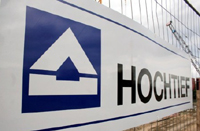 Spanish construction group ACS, currently holding 29.98% of German construction giant Hochtief, is to raise its holding, initially to over 30% and in the immediate term to up to 50%. So far the Spaniards are offering eight ACS shares in exchange for five securities of the MDAX company. This means the offering has a value of €2.7 billion. The Essen company initially made political appeals: Hochtief had to be rescued because ACS had for years been spoon-fed with EU subsidies, meaning German money too. While German chancellor Angela Merkel (CDU) turned this down, the SPD jumped on the wagon and is now calling for the Takeover Act to be amended so that even after the 30% threshold is passed a compulsory bid becomes due if holdings are expanded. Merkel instead offered practical help, mediating talks with Qatar’s Minister for the Economy. The Emirate, speculates Der Spiegel, is to be recruited as an investor, making it a white knight. As a poison pill, Hochtief is also contemplating a capital increase that would dilute the ACS holdings and make it more expensive for ACS to come in. Additionally, the Essen company has asked Australian stock exchange regulators to look into whether ACS ought not to make a bid for the shares of Hochtief’s profitable and valuable subsidiary Leighton, in which the Hochtief holding is 54%. The approach was initially turned down. After Leighton itself asked ACS for a separate bid for 45% of its shares, the decision on this is now before the so-called takeover panel. If this body calls for a compulsory bid for Leighton, the whole takeover would be €3 billion more expensive, so that it would probably collapse. In the meantime, in November the Spaniards are intending to decide a capital increase by up to 50% of share capital, to stock up their war chest. The Federal Institution for financial services oversight (BaFin) has now ordered that a definitive offer by ACS to Hochtief shareholders must be made by the end of January 2011, not before.
Spanish construction group ACS, currently holding 29.98% of German construction giant Hochtief, is to raise its holding, initially to over 30% and in the immediate term to up to 50%. So far the Spaniards are offering eight ACS shares in exchange for five securities of the MDAX company. This means the offering has a value of €2.7 billion. The Essen company initially made political appeals: Hochtief had to be rescued because ACS had for years been spoon-fed with EU subsidies, meaning German money too. While German chancellor Angela Merkel (CDU) turned this down, the SPD jumped on the wagon and is now calling for the Takeover Act to be amended so that even after the 30% threshold is passed a compulsory bid becomes due if holdings are expanded. Merkel instead offered practical help, mediating talks with Qatar’s Minister for the Economy. The Emirate, speculates Der Spiegel, is to be recruited as an investor, making it a white knight. As a poison pill, Hochtief is also contemplating a capital increase that would dilute the ACS holdings and make it more expensive for ACS to come in. Additionally, the Essen company has asked Australian stock exchange regulators to look into whether ACS ought not to make a bid for the shares of Hochtief’s profitable and valuable subsidiary Leighton, in which the Hochtief holding is 54%. The approach was initially turned down. After Leighton itself asked ACS for a separate bid for 45% of its shares, the decision on this is now before the so-called takeover panel. If this body calls for a compulsory bid for Leighton, the whole takeover would be €3 billion more expensive, so that it would probably collapse. In the meantime, in November the Spaniards are intending to decide a capital increase by up to 50% of share capital, to stock up their war chest. The Federal Institution for financial services oversight (BaFin) has now ordered that a definitive offer by ACS to Hochtief shareholders must be made by the end of January 2011, not before.
Accounting errors at Conti
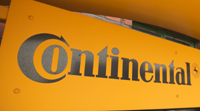 Continental has been criticized by the German accounting panel (DPR) for its valuation of goodwill in its 2008 group report, reported Börsen-Zeitung on 13 October. The error announcement required by BaFin stated that the intrinsic value of the transaction or firm had not at the time been disclosed in its full amount. The ensuing depreciation test led to further write-offs of €876 million in the 2009 group report. In May 2009 the DPR had already begun an audit of the group report and final report, as well as of the group situation report and the situation report for the business year 2008.
Continental has been criticized by the German accounting panel (DPR) for its valuation of goodwill in its 2008 group report, reported Börsen-Zeitung on 13 October. The error announcement required by BaFin stated that the intrinsic value of the transaction or firm had not at the time been disclosed in its full amount. The ensuing depreciation test led to further write-offs of €876 million in the 2009 group report. In May 2009 the DPR had already begun an audit of the group report and final report, as well as of the group situation report and the situation report for the business year 2008.
Buffett builds up
Warren Buffett has built up his holding in Munich Re to 10.244%. As further stated on 19 October, the well-known US investor, while he wants to increase his holding in the world’s biggest reinsurer in coming months, is not seeking any influence. Buffet will in future too stay away from appointments to the administration (board and supervisory board) and from strategic questions. The investment was aimed solely at securing trading profits, not attaining strategic objectives.
Lex Commerzbank
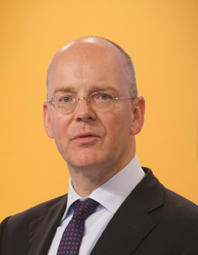 By 2012 at latest, Commerzbank CEO Martin Blessing wants to repay the total of €18.2 billion the government granted the number 2 among German private credit institutions as a financial injection during the crisis. If the Bundestag adopts the Restructuring Act before it on 12 November, the Frankfurt bank could raise the necessary funds through a capital increase, bringing it a big step closer to repayment. The AGM had already agreed in May to build up the capital. Currently the Commerzbank’s share is floundering at around €6, so that a regular capital increase by the statutory regulated maximum of 50% of share capital, i.e. 590 million units, would raise only around €3.7 billion – far less than the €18.2 billion needed. The new act overturns the 50% rule for credit institutions that have to repay state aid. De facto that applies only to Commerzbank. The “Lex Commerzbank” is to be passed by the Bundesrat on 26 November and enter into force in early January 2011.
By 2012 at latest, Commerzbank CEO Martin Blessing wants to repay the total of €18.2 billion the government granted the number 2 among German private credit institutions as a financial injection during the crisis. If the Bundestag adopts the Restructuring Act before it on 12 November, the Frankfurt bank could raise the necessary funds through a capital increase, bringing it a big step closer to repayment. The AGM had already agreed in May to build up the capital. Currently the Commerzbank’s share is floundering at around €6, so that a regular capital increase by the statutory regulated maximum of 50% of share capital, i.e. 590 million units, would raise only around €3.7 billion – far less than the €18.2 billion needed. The new act overturns the 50% rule for credit institutions that have to repay state aid. De facto that applies only to Commerzbank. The “Lex Commerzbank” is to be passed by the Bundesrat on 26 November and enter into force in early January 2011.
Bidding war at Demag Cranes
Demag Cranes would stay independent and expand into emerging economies on its own forces, said Aloysius Rauen, CEO of Düsseldorf crane maker Demag Cranes, to repel the advances by Finnish competitor Konecranes. In September the Finns had already presented the Demag management with a plan for a possible merger of the two cranemakers. Rauen thereupon indicated that talks with interested parties were not in the interest of the company or its stakeholders. He turned down an invitation to Finland in October. Instead, Rauen went on a road show to advocate independence for his company. In parallel, US building-equipment maker Terex also indicated an interest in the Düsseldorf company. The takeover rumors drove the Demag share prize up by over 50% to upwards of €36 per share.
Cheap bid for Postbank
 Deutsche Bank had barely completed a record capital increase by €10.2 billion when as Germany’s biggest private bank it made Deutsche Postbank shareholders a takeover bid. €25 per share, the legal minimum, is what Deutsche Bank CEO Josef Ackermann is still offering free shareholders of the Bonn bank until 24 November. The independent shareholders hold some 31% of the Postbank securitites, and Deutsche Bank around 29.95%. Before the end of this year Ackermann wants to consolidate Postbank, which means taking the 50% hurdle. But resistance is growing among the shareholder defence organizations. By contract, Deutsche Bank has to take over a Postbank share block of 27.4% in 2012 and pay €45 per share for it. European shareholder association Deminor wants to bring in the Federal Institute for financial services oversight (BaFin), and is, along with German investment company Effecten-Spiegel, threatening a lawsuit against the low offer. German investor protectors expect an improvement in the bid and are advising their members to wait.
Deutsche Bank had barely completed a record capital increase by €10.2 billion when as Germany’s biggest private bank it made Deutsche Postbank shareholders a takeover bid. €25 per share, the legal minimum, is what Deutsche Bank CEO Josef Ackermann is still offering free shareholders of the Bonn bank until 24 November. The independent shareholders hold some 31% of the Postbank securitites, and Deutsche Bank around 29.95%. Before the end of this year Ackermann wants to consolidate Postbank, which means taking the 50% hurdle. But resistance is growing among the shareholder defence organizations. By contract, Deutsche Bank has to take over a Postbank share block of 27.4% in 2012 and pay €45 per share for it. European shareholder association Deminor wants to bring in the Federal Institute for financial services oversight (BaFin), and is, along with German investment company Effecten-Spiegel, threatening a lawsuit against the low offer. German investor protectors expect an improvement in the bid and are advising their members to wait.
Puma stumbles in Greece
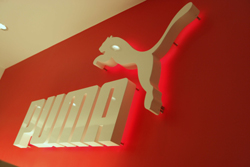 Actually, the figures for the current year were encouraging. Yet sports-goods maker Puma nonetheless had to mix some bitterness in with the figures for the future. The management and the partners in the joint venture Puma Hellas S.A. (Puma share 70%), the Glou brothers, have systematically misappropriated money and defrauded over the years; this was the finding of initial special investigations by auditors. Now the balance sheets for earlier years must be adjusted and a total of €115 million in special write-offs before tax be made. In 2010 alone, the cost of the scandal will amount to €30 million. The figures for 2009 will have to be corrected. In the meantime, a new management had been put in place for Greece. Civil and criminal claims against the minority partners and the former management were being looked into.
Actually, the figures for the current year were encouraging. Yet sports-goods maker Puma nonetheless had to mix some bitterness in with the figures for the future. The management and the partners in the joint venture Puma Hellas S.A. (Puma share 70%), the Glou brothers, have systematically misappropriated money and defrauded over the years; this was the finding of initial special investigations by auditors. Now the balance sheets for earlier years must be adjusted and a total of €115 million in special write-offs before tax be made. In 2010 alone, the cost of the scandal will amount to €30 million. The figures for 2009 will have to be corrected. In the meantime, a new management had been put in place for Greece. Civil and criminal claims against the minority partners and the former management were being looked into.
In the meantime, French luxury goods group PPR is tying Puma, in which it currently holds just over 70%, more tightly into the group. In April 2011 shareholders in the Herzogenaurach firm should agree to a transformation into a European Company (Societas Europaea). Instead of the dual system of supervisory board and executive board there will then be an administrative board able to give instructions to the managing directors. Puma CEO Jochen Zeitz will become the new chair of the administrative board and at the same time head the newly-created sport and lifestyle segment in the PPR structure. Shareholder protectors are critical of these transformation plans.
TUI finds accounting errors
 Over several years, accounting errors in the IT system of British TUI subsidiary TUI Travel had accumulated. The mistakes have now been recognized, and TUI Travel has to write off £117 million (€120 million), £88 million of it for the business year 2009/10 that ended in September alone. After the correction, TUI Travel’s balance sheet for the previous year will show a result £42 million down. These value corrections at the British subsidiary will affect its parent in Hanover, which holds 57% of the TUI Travel shares. On the TUI balance sheet for the rump business year 2009, the EBITA for the segment is rated at €45 million. €75 million go to the years before 2009, to be rectified as a balance-sheet correction to the equity capital in 2009. In consequence, TUI Travel CFO Paul Bowtell will be taking off his hat at the end of the year.
Over several years, accounting errors in the IT system of British TUI subsidiary TUI Travel had accumulated. The mistakes have now been recognized, and TUI Travel has to write off £117 million (€120 million), £88 million of it for the business year 2009/10 that ended in September alone. After the correction, TUI Travel’s balance sheet for the previous year will show a result £42 million down. These value corrections at the British subsidiary will affect its parent in Hanover, which holds 57% of the TUI Travel shares. On the TUI balance sheet for the rump business year 2009, the EBITA for the segment is rated at €45 million. €75 million go to the years before 2009, to be rectified as a balance-sheet correction to the equity capital in 2009. In consequence, TUI Travel CFO Paul Bowtell will be taking off his hat at the end of the year.
There is by contrast an upswing at shipowning subsidiary Hapag-Lloyd. After the company had got into difficulties last year, it gave back to the government a €1.2 billion guarantee given at the end of September and never used, and now the whole financing of the Hamburg company can be re-arranged. In the first place, Hapag-Lloyd is to get a syndicated loan of €360 million. Secondly, a bridging loan of €227 million from parent TUI has already been repaid. The ending of the government guarantees will also mean resumption of interest payments to the parent. The fact that investors too have confidence in the shipping line is demonstrated by company loan placed in early October amounting to $700 million, which was raised by €150 million because of the high demand. The refinancing is regarded as a requirement in order to help TUI to get out of Hapag-Lloyd. TUI currently holds 43% of the shares.
DAX companies shut down social networks
 For fear of security gaps and data espionage, some DAX companies are blocking access at workplaces to social networks like Facebook. Popular online services like short-message service Twitter and video portal YouTube are also being blocked, the Wirtschaftswoche reported. As well as fear of economic espionage and data security, the lower productivity of employees played a part too. Experts, however, advise against shutdowns. Employees ought instead to be sensitized, warned Christian Fuchs of security specialists Kaspersky. On the other hand, increasing numbers of companies are using the networks as communications channels, and over two thirds of DAX companies intend not to block them off.
For fear of security gaps and data espionage, some DAX companies are blocking access at workplaces to social networks like Facebook. Popular online services like short-message service Twitter and video portal YouTube are also being blocked, the Wirtschaftswoche reported. As well as fear of economic espionage and data security, the lower productivity of employees played a part too. Experts, however, advise against shutdowns. Employees ought instead to be sensitized, warned Christian Fuchs of security specialists Kaspersky. On the other hand, increasing numbers of companies are using the networks as communications channels, and over two thirds of DAX companies intend not to block them off.
Buhlmann's Corner
HochTief and the shareholders
 Spurred on by Dr. Lü, the Teutons whisper, “the ugly foreigners are destroying the noble (German) economy.” But aren’t we all “foreigners”? The Hessian in Bavaria, the Baden man in Stuttgart, the German in Portugal or in America? In the latter case, it can go wrong: one in four Texans has Hessian-German blood.
Spurred on by Dr. Lü, the Teutons whisper, “the ugly foreigners are destroying the noble (German) economy.” But aren’t we all “foreigners”? The Hessian in Bavaria, the Baden man in Stuttgart, the German in Portugal or in America? In the latter case, it can go wrong: one in four Texans has Hessian-German blood.
Let’s turn to something essential: the law! The Schaeffler family laugh blood and tears when they think of German laws investors are supposed be “protected” by. The reason for the failure of the “grande dame” was not the law, but the bad timing. The same misconception was also Continental’s when it let luckier Siemens talk it into swallowing the VDO titbit. Incidentally, a titbit that came from Mannesmann, when it was broken up toin the world’s largest takeover by the evil aliens of the day, Vodafone. A few years and a change of leadership later, shareholders wrote down those takeover prices “cash-neutrally”.
Where even the law does not help (it did not help against Porsche either – there too at the end it was foreigners from Austria taking over, in cooperation with Qatar), then politics should be kept out rather than brought in. Lü should still recall how an SPD party conference brought a political commitment at his last employer, Holzmann, but provided no solution.
Dr. Lü is only the successful synonym of the board member in the post-Germany-Inc. era. If directors paid more attention to shareholders and a “correct” valuation of the shares that are the capital base they sit and work on, then no one – no Schaeffler from Herzogenaurach, no Piëch-Porsche from Salzburg, no football president from Madrid and no sheikh from the Gulf – would be able to buy up, destroy or loot companies – no matter whether the buyer has that in mind or something else.
If ACS can buy HochTief at the low point in the stock market, then this is because of the shareholders’ low interest in the company and, further down, the low motivation of the HochTief Executive Board. The stock market lives on highs and lows; whoever does not want that must abolish the exchanges – not only the lows, but the highs too.
ACTIONS CORNER
The Daimler-Chrysler merger in 1998 was based on appropriate evaluations, so that no compensation payments to former Daimler Benz shareholders are necessary. This was decided unappealably by the Stuttgart Higher Regional Court (OLG) in an administrative decision procedure that ended a legal dispute lasting twelve years. The 20th civil division chaired by OLG president Eberhard Stilz thus accepted a complaint by Daimler against an August 2006 ruling by Stuttgart Regional Court. It saved Daimler a payment totaling €230 million to its former shareholders applied by the court of first instance.
Deutsche Bank has had another of its innumerable court actions against Leo Kirch decided in its favour. Frankfurt Higher Regional Court (OLG) found the resolutions of the 2007 AGM effective almost completely. The actions for avoidance and nullity against resolutions had remained “overwhelmingly unsuccessful” on appeal too, it was stated in a court announcement on 20 October. The decisions giving discharge to the board and supervisory board for 2006 were declared null and void. The bank need not set aside any reserves for possible damage payments.
In the case over risky interest transactions with sewage group Mariatal, Deutsche Bank had to accept defeat in Stuttgart Higher Regional Court (OLG). In a judgment on 28 October, the OLG allowed the group of municipalities full compensation for faulty advice by the bank. The court saw no misconduct by the opposite side and sentenced the bank to a €710,000 fine. The lower-court verdict by Ulm Regional Court in favour of the bank was thus set aside. Deutsche Bank announced it would appeal.
Deutsche Telekom has failed in its attempt to defend against an administrative fine for abusing its market position between 1998 and 2003. The European Court of Justice on 14 October confirmed the EU Commission’s decision of 2003 and the European Court judgment of 2008 in first instance for abuse of dominant position on the markets for fixed-line telephone services by Telekom, also confirming the penalty of €12.6 million imposed on it. The former monopolist had demanded higher fees for the last mile from its competitors than from its own end customers.
The dispute between Deutsche Telekom and T-Online minority shareholders suing it is now to go before the Federal Constitutional Court. The shareholders should receive a higher compensation payment. The Dreier Riedel law firm lodged a constitutional complaint to this effect on 18 October against the ruling by Frankfurt Higher Regional Court (OLG). In the law firm’s view, investors had received too little compensation. In early September the OLG had confirmed a decision by Frankfurt Regional Court finding an extra payment of €1.15 plus €0.23 interest per T-Online share appropriate.
In the action about the spying case at Deutsche Telekom, Kai-Uwe Ricke testified in Bonn on 22 October, contradicting several statements by the main accused that heavily incriminated him. Klaus T. had testified that the ex CEO had been informed of the utilization of journalists', and works council and supervisory board members' telephone connections. Public prosecutors at the time suspended investigations of Ricke. Telekom has announced it will ask for compensation of some €1 million each from Zumwinkel and Ricke.
The Federal Court of Justice has freed Wilhelm Schelsky of the charge of breach of trust, thus partly accepting the appeal by the ex head of employee organization AUB. Schelsky’s lawyer had repeatedly stressed that the lack of financial checks by the Siemens board on consultants' fees ought not to be counted against Schelsky. However, the whole case did not need to be reopened before Nürnberg-Fürth Regional Court, but merely the amount of penalty re-calculated. Schelsky’s conviction for fraud and tax evasion in November 2008 remained untouched.
AGM Dates
November http://www.vip-cg.com/hvagendachrono.php?l=en&filter=&fidatum=2010-11
December http://www.vip-cg.com/hvagendachrono.php?l=en&filter=&fidatum=2010-12
January http://www.vip-cg.com/hvagendachrono.php?l=en&filter=&fidatum=2011-01-
Politics
USA delays IFRS
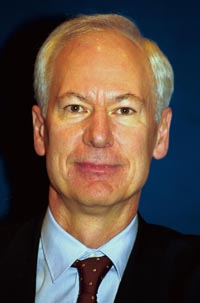 The German government is calling on the US to accept international accounting, and pushing for more of an orientation towards sustainable business in the international accounting standards, stated the Börsen-Zeitung on 6 October. While in late February the SEC had in principle confirmed introduction of international accounting standards according to IFRS for US firms too from 2015-16 onward, to date the US have not yet made any clear commitments. Specific decisions can, however, be expected only in coming years. It is therefore unclear whether and when the as far as possible uniform accounting standards for listed and capital-market-oriented companies aimed at by the German government will become a reality. The trend to fair-value accounting, which treats unrealized value increases in exactly the same way as realized ones, is under increasing international criticism here. Current value accounting had proved “volatile, pro-cyclical, and too short-term oriented” in the crisis, said Bundesbank president Franz-Christoph Zeitler, who is also calling for accounting rules to be checked with an eye to the goal of sustainability.
The German government is calling on the US to accept international accounting, and pushing for more of an orientation towards sustainable business in the international accounting standards, stated the Börsen-Zeitung on 6 October. While in late February the SEC had in principle confirmed introduction of international accounting standards according to IFRS for US firms too from 2015-16 onward, to date the US have not yet made any clear commitments. Specific decisions can, however, be expected only in coming years. It is therefore unclear whether and when the as far as possible uniform accounting standards for listed and capital-market-oriented companies aimed at by the German government will become a reality. The trend to fair-value accounting, which treats unrealized value increases in exactly the same way as realized ones, is under increasing international criticism here. Current value accounting had proved “volatile, pro-cyclical, and too short-term oriented” in the crisis, said Bundesbank president Franz-Christoph Zeitler, who is also calling for accounting rules to be checked with an eye to the goal of sustainability.
Print to be compulsory again?
The abolition of compulsory securities disclosures in print media might be further delayed. The German government, according to its own statements, has not yet decided whether the transition period should again be extended. Once it expires, information for investors need be disclosed only electronically, no longer in so-called official bourse gazettes. The SPD’s financial-markets expert Carsten Sieling is demanding that small investors should continue to be able to follow up all relevant information in a daily newspaper. The German legislature had initially, when it took over the EU transparency directive in 2006, created a transition period until the end of 2008 up to which publication in print media continued to be necessary. After one and a half years, the German government assessed the process with the assistance of financial-market watchdogs BaFin and of market participants and investor protectors, and extended the period by two further years until the end of 2010. Issuers are complaining of the high costs of disclosures.
Bankers’ bonuses too high
 The pay of executives of state-supported banks has been limited to €500,000 since last year. However, this provision so far does not apply to second- and third-rank managers. A check by the government’s stabilization fund (SoFFin) showed that 68 employees below board level were receiving more than the highest amount specified for executives. 35 of these managers work at Commerzbank, 24 at WestLB, seven for Aareal Bank and two for HRE. HRE alone paid bonuses for the year 2009, when high losses were registered, amounting to 25 million Euros to 1,400 employees. Against this background, the North-Rhein-Westphalia state government wishes through a Bundesrat initiative to limit pay of all bankers, not just executives, in state-supported credit institutions to €500,000. Europe’s banking watchdogs are also discussing whether to limit bonuses in future to a specified multiple of basic pay. Only a maximum of 20% of bonuses is to be paid out, with the rest distributed in the form of shares.
The pay of executives of state-supported banks has been limited to €500,000 since last year. However, this provision so far does not apply to second- and third-rank managers. A check by the government’s stabilization fund (SoFFin) showed that 68 employees below board level were receiving more than the highest amount specified for executives. 35 of these managers work at Commerzbank, 24 at WestLB, seven for Aareal Bank and two for HRE. HRE alone paid bonuses for the year 2009, when high losses were registered, amounting to 25 million Euros to 1,400 employees. Against this background, the North-Rhein-Westphalia state government wishes through a Bundesrat initiative to limit pay of all bankers, not just executives, in state-supported credit institutions to €500,000. Europe’s banking watchdogs are also discussing whether to limit bonuses in future to a specified multiple of basic pay. Only a maximum of 20% of bonuses is to be paid out, with the rest distributed in the form of shares.
Basel III: Advantages for cooperative banks
After the Basel committee for bank regulation reached agreement to equity-capital rules for financial houses in September, the credit institutions’ liquidity buffers are now coming under fire. According to Financial Times Deutschland, countries like Germany, France, Brazil, Italy and Japan have agreed in a discussion paper that looser liquidity rules should apply to top institutions acting in concert than to other banks. The point is controversial, since the rule would apply not just to cooperative banks, but also to Landesbanks. However, these were particularly hard hit by the crisis. The committee is agreed that credit institutions in general ought to keep higher liquid resources available in order to remain solvent in severe crises. Short-term and long-term liquidity indices are under discussion.
Tax on financial activities instead of financial transactions
In early October tax commissioner Algirdas Semeta gave a definite no on a financial-transactions tax. It would make little sense for Europe to go it alone here, was the reason. Germany and Austria had strongly supported taxing financial transactions, but had already failed at international level in the G20 in late June and were now pushing for a European solution. The financial-transaction tax model provides for a tax of 0.01 to 0.5% on the purchase or sale of shares, derivatives or currency on the exchange. The counter-argument, now brought up by Semeta too, is that if Europe goes it alone, stock-exchange transactions would move out into other regions. With the financial-activity tax advocated by Semeta and brought into the discussion by the IMF, by contrast, the entire profits of financial institutions, and bonuses exceeding a certain amount, would have a levy charged on them. This tax would affect the financial economy as a whole, but not dam speculation, say critics. Bank association Bundesverband deutscher Banken (BdB) strongly rejects any further bank taxes.
Company ratings: open to new providers
As a consequence of the financial crisis, which was partly fueled by the ratings by the established ratings agencies, firms evaluating companies for their creditworthiness will as from 2011 have to be licensed by the financial oversight authorities. Alongside established agencies like Standard & Poors, Moodys or Fitch, particularly such smaller and new companies as fund rater Feri, Creditreform of Düsseldorf, French credit insurer Coface or Allianz subsidiary Euler Hermes are coming on to the market. The Federal Institute for financial services oversight (BaFin) had registration applications from eleven suppliers in Germany before it by the end of October. Europe-wide, 25 companies are seeking a licence. The newcomers see growth chances particularly in rating small businesses.
Also at the end of October, the Financial Stability Board (FSB), which coordinates reform of worldwide financial systems for the G20 countries, published a list of proposals for reducing the influence of ratings agencies. It calls for authorities, banks and investors to develop alternative standards for rating a company’s creditworthiness.
People
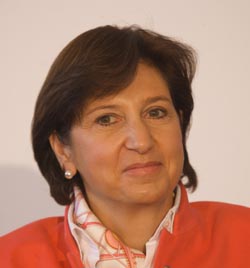 Margret Suckale is coming on to the BASF board. With effect from the end of the AGM on 6 May 2011 the former railway manageress becomes labour director and head of sector II, and Michael Heinz becomes head of sector IV, both new on the board. The new Chief Financial Officer is to be Hans-Ulrich Engel, who will take on sector III, with a location in the US. The post is becoming free when Kurt Bock succeeds Jürgen Hambrecht at the head of the chemicals firm. Hambrecht and John Feldmann are to retire at the end of the 2011 AGM. Harald Schwager succeeds Engel at the head of Sector V (Oil & Gas, Europe, Construction Chemicals, Global Procurement & Logistics). Martin Brudermüller becomes deputy CEO.
Margret Suckale is coming on to the BASF board. With effect from the end of the AGM on 6 May 2011 the former railway manageress becomes labour director and head of sector II, and Michael Heinz becomes head of sector IV, both new on the board. The new Chief Financial Officer is to be Hans-Ulrich Engel, who will take on sector III, with a location in the US. The post is becoming free when Kurt Bock succeeds Jürgen Hambrecht at the head of the chemicals firm. Hambrecht and John Feldmann are to retire at the end of the 2011 AGM. Harald Schwager succeeds Engel at the head of Sector V (Oil & Gas, Europe, Construction Chemicals, Global Procurement & Logistics). Martin Brudermüller becomes deputy CEO.
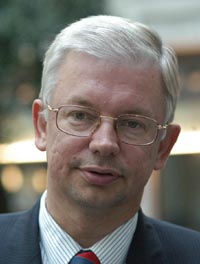
On 1 March 2011 Roland Koch becomes CEO at Bilfinger Berger. This was decided by the supervisory board, it was stated by Germany’s second-biggest construction firm in Mannheim. As from 1 July 2011 he is to succeed Herbert Bodner as CEO. Bodner will then be retiring after twelve years as CEO.
The Schaeffler group is surprisingly withdrawing Hans Rolf Koerfer from the Continental supervisory board. The lawyer will “make his position available”, stated a communiqué from the group of companies, which since 2008 has been the major shareholder in the automotive supplier and tire maker. Talks are to be held with supervisory board chair Wolfgang Reitzle on timing and succession.
Jens Tischendorf has joined the supervisory board of Demag Cranes with immediate effect. The Germany head of new major shareholder Cevian Capital is taking the seat from Martin Posth, who resigned after four years. The former VW executive reached the age of 65 in 2009, but is to remain linked with the Düsseldorf crane builder as a consultant.
Thomas Wellauer resigned his supervisory board post at Münchener Rückversicherungs-Gesellschaft as of 30 September. According to indications, the 55-year-old entrepreneur became Chief Operations Officer and management member of Swiss Re on 1 October. Because of this conflict of interests he had to leave Munich Re. The succession to him will be decided by April 2011 at latest.
Dan Marks has left ProSiebenSat.1 Media “for personal reasons”, since he wishes to join his family in London. The former Hollywood director became a board member at the group only on 1 May. He had taken over the Online/Pay-TV spot from Marcus Englert. Until succession arrangements are made, Thomas Ebeling is to head the sector provisionally.
Jochen Zeitz will leave operative management at PUMA in the coming year. The long-term PUMA CEO will become chair of the administrative board in April 2011 after its conversion from a German limited company to a Societas Europaea.
At Diesel engine and plant builder Tognum in Friedrichshafen, Rainer Breidenbach (55), head of the engines sector, is resigning at the year’s end at his own request. His successor will be Peter Kneipp (52), who has since 2004 headed the fastest-growing Tognum subsidiary MTU Asia as president and CEO.
Campus
Pensions gap
 In the DAX 30 companies, the gap in coverage could rise by €40 billion to €115 billion, in the light of developments in the US and British markets. This was found by a Mercer analysis on the development of balance-sheet disclosure of commitments to promised benefits. The cause is the decline in yields on corporate bonds, which affect the value of pension-plan commitments shown on the balance sheet. The yields on corporate bonds are the basis for deriving the interest rate for accounting purposes to be used in discounting future payment flows resulting from pension commitments. In Germany and the Euro zone these have declined, at good soundness, from 5.09% at the end of 2009 to 3.95% in late September 2010. Dax companies’ commitments, currently €220 billion, could rise by some 50 billion, whereas the value of pension-fund assets will rise by only a good ten billion, explains Thomas Hagemann, Mercer’s chief actuary in Germany.
In the DAX 30 companies, the gap in coverage could rise by €40 billion to €115 billion, in the light of developments in the US and British markets. This was found by a Mercer analysis on the development of balance-sheet disclosure of commitments to promised benefits. The cause is the decline in yields on corporate bonds, which affect the value of pension-plan commitments shown on the balance sheet. The yields on corporate bonds are the basis for deriving the interest rate for accounting purposes to be used in discounting future payment flows resulting from pension commitments. In Germany and the Euro zone these have declined, at good soundness, from 5.09% at the end of 2009 to 3.95% in late September 2010. Dax companies’ commitments, currently €220 billion, could rise by some 50 billion, whereas the value of pension-fund assets will rise by only a good ten billion, explains Thomas Hagemann, Mercer’s chief actuary in Germany.
Shaky board seats
Board members worldwide keep their seats for less than four years. Tighter controls by supervisory boards have had the consequence that the duration of office is increasingly falling, a survey by headhunters AESC (Association of Executive Search Consultants) to be published in late November finds. According to Booz Allen Hamilton, German board members' period in office fell from 1998 through 2007 from an average of 8.3 years to 4.7. According to Bain, the figure for Germany is five and a half years. 70% of the 400 to 500 personnel consultants surveyed assumed that the duration of posts will follow the long-term trend and continue to decline in future – the main reason being, however, differences in opinion between board and supervisory board.
Handelsblatt on top
Among financial experts' compulsory daily reading, the Handelsblatt leads Financial Times Deutschland, the Börsenzeitung and the Frankfurter Allgemeine Zeitung. This was the finding of a survey by consultancy firm IP.on among small- and mid-cap analysts. As regards quality, though, the Börsenzeitung was clearly on top. Among information services, Bloomberg ranks above Reuters and Dow Jones.
Revealing words
If board members presenting business reports frequently use the word “we” instead of “I”, that may in certain circumstances be an indication that their statements are untrue or inaccurate, finds a still unpublished study by Harvard University. The two researchers involved evaluated some 30,000 telephone conferences between 2003 and 2007 and analysed them on the basis of linguistic models. In particular, they looked into which statements had to be corrected shortly after, assuming that managers already knew at the data presentation that the figures were less rosy than presented.
K+S business report is No. 1
In 2009, according to manager magazine, K+S published the best business report. In the overall assessment, MDax companies MTU Aero Engines and Deutsche Post followed in second and third place. The winner in the TecDax was solar specialist Solarworld.
Economic situation on the up
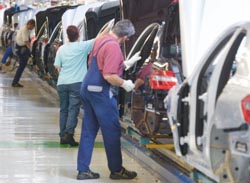 Three quarters of German IR managers assessed the current position as an improvement. 56%, more than ever before, are also optimistic about the future. In the half-yearly survey, Deutsche Investor Relations Verband (DIRK) surveyed German, Austrian and Swiss IR chiefs, as well as British ones for the first time. Particularly financial-services providers, banks and technology and pharmaceutical companies are optimistic. The corresponding figures for Switzerland, Austria and Britain are slightly below those for Germany. According to the IR managers assessments, institutional investors (41.0%) lay the greatest value on the theme of sustainability, while journalists (10.4%) and employees (9.7%) are less interested in this topic. 62% of respondents find the topic currently less important, but 70.1% believe that its relevance will increase in future. 76.2% of DAX companies already have binding sustainability standards, and a further 19% will develop them in the next 12 months. This trend is downward in the MDax and TecDax.
Three quarters of German IR managers assessed the current position as an improvement. 56%, more than ever before, are also optimistic about the future. In the half-yearly survey, Deutsche Investor Relations Verband (DIRK) surveyed German, Austrian and Swiss IR chiefs, as well as British ones for the first time. Particularly financial-services providers, banks and technology and pharmaceutical companies are optimistic. The corresponding figures for Switzerland, Austria and Britain are slightly below those for Germany. According to the IR managers assessments, institutional investors (41.0%) lay the greatest value on the theme of sustainability, while journalists (10.4%) and employees (9.7%) are less interested in this topic. 62% of respondents find the topic currently less important, but 70.1% believe that its relevance will increase in future. 76.2% of DAX companies already have binding sustainability standards, and a further 19% will develop them in the next 12 months. This trend is downward in the MDax and TecDax.
DVFA is 50 years old
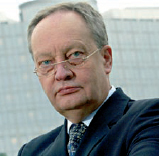 In late October, the Deutsche Vereinigung für Finanzanalyse und Asset Management (DVFA) marked its 50-year jubilee with a celebration. The DVFA is the professional association of investment professionals, a member of EFFAS and ACIIA, and networked Europe-wide and worldwide. Currently it has 1,200 personal members, working as specialists and executives at over 400 investment houses, banks and fund companies or as independent capital-market service providers. Additionally, with four postgraduate programmes the DVFA is the leading training institution for the capital market, with now over 3,500 graduates. The DVFA also holds over 250 analyst conferences yearly, and in its panels to evaluate companies confers well-known distinctions like the Capital Investor Relations Prize and the Euro-finance Prize for Corporate Governance. It also sets standards for professional practice on the capital market that are acquiring increasing importance, ranging from the DVFA code for asset managers, investment consultants and analysts to the principles for fairness opinions. The high and growing importance of the DVFA is the merit particularly of long-term board chairman Fritz H. Rau, who made the DVFA’s name as a standard setter for the capital market.
In late October, the Deutsche Vereinigung für Finanzanalyse und Asset Management (DVFA) marked its 50-year jubilee with a celebration. The DVFA is the professional association of investment professionals, a member of EFFAS and ACIIA, and networked Europe-wide and worldwide. Currently it has 1,200 personal members, working as specialists and executives at over 400 investment houses, banks and fund companies or as independent capital-market service providers. Additionally, with four postgraduate programmes the DVFA is the leading training institution for the capital market, with now over 3,500 graduates. The DVFA also holds over 250 analyst conferences yearly, and in its panels to evaluate companies confers well-known distinctions like the Capital Investor Relations Prize and the Euro-finance Prize for Corporate Governance. It also sets standards for professional practice on the capital market that are acquiring increasing importance, ranging from the DVFA code for asset managers, investment consultants and analysts to the principles for fairness opinions. The high and growing importance of the DVFA is the merit particularly of long-term board chairman Fritz H. Rau, who made the DVFA’s name as a standard setter for the capital market.
DAI becomes DVAI
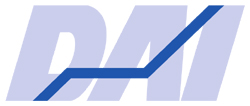 The German Supervisory Boards Institute (DAI) has been renamed German Management & Supervisory Boards Institute (DVAI). This, says DAI President Professor Marcus Labbé, should make it clear that the Institute will also participate in the process of professionalizing management boards in the public sector.
The German Supervisory Boards Institute (DAI) has been renamed German Management & Supervisory Boards Institute (DVAI). This, says DAI President Professor Marcus Labbé, should make it clear that the Institute will also participate in the process of professionalizing management boards in the public sector.
Capital News
ElringKlinger has issued 5,759,990 new shares ex rights. The automotive supplier had announced the capital increase in order to secure fresh resources for additional purchases and growth. It should make the Dettingen company's financing more independent of free cash flow. As was announced after the close of Xetra trading, the securities were sold in an accelerated book-building process. The capital increase from the placement amounted to €124 million. The proceeds are to be used inter alia to finance purchase of the Freudenberg group's business in static metal seals.
SMARTRAC has carried out a capital increase of some €26 million. The proceeds of the issue are intended to increase the security technology firm’s financial flexibility for further growth. One Equity Partners subscribed 10% of the issue at €17.50 each in cash, stated the wireless chip maker. The TecDax-listed company's registered capital was raised ex rights from €7,424,999.50 to €8,167,498.50. The issue is part of the basis agreement on the takeover of SMARTRAC concluded on 13 August.
Director's Dealings
in October
| Company | Person | Function | Buy / Sell | Total value in Euro | Number of shares | Datum |
| DEUTSCHE BANK | Sir Peter Job | SB | B | 66.000 | 2.000 | 05.10.2010 |
| ElringKlinger | Lechler International GmbH | B | 3.999.989 | 186.046 | 11.10.2010 | |
| Heidelberger Druck | Moritz Plenz | B | 3.480 | 1.000 | 21.10.2010 | |
| Kabel Deutschland | Basil Management Inc. | S | 7.074.155 | 257.242 | 11.10.2010 | |
| MERCK | Dr. Frank Stangenberg-Haverkamp | B | 121.645 | 2.000 | 05.10.2010 | |
| Nordex | Ventus Venture Fund | B | 1.703.377 | 253.314 | 29.09.-05.10.2010 | |
| Sky Deutschland | Dr. Stefan Jentzsch | SB | B | 42.000 | 40.000 | 01.10.2010 |
| Smartrac | Tirza Trappe-Fischer | S | 200.000 | 10.000 | 22.10.2010 | |
| Smartrac | Dr. Christian Fischer | MB-Head | S | 1.960.700 | 98.035 | 22.10.2010 |
| Smartrac | ICM Netherlands B.V. | S | 9.207.000 | 460.350 | 22.10.2010 |
VIPsight Shareholders
in October
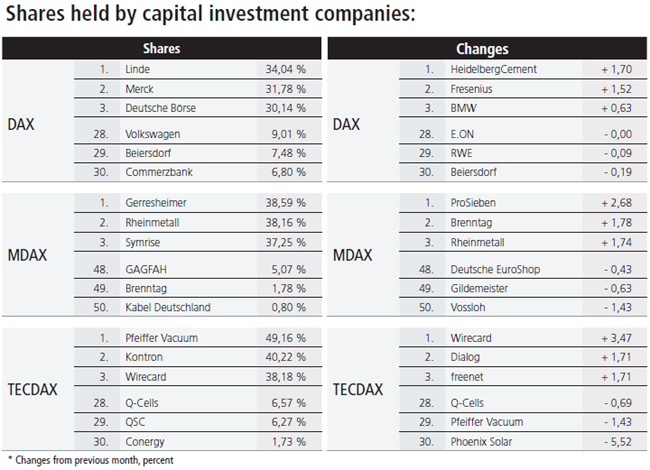
VIPsight Shareholder ID <click here>
Event Diary
11 November 2010 Neuerungen im Investmentrecht: OGAW-IV-Umsetzung und erweiterte BaFin-Anforderungen [changes in investment law: UCITS IV adoption and enhanced BaFin requirements]
Organizer: DAI; place: IHK, Börsenplatz 2-4, Frankfurt am Main; cost: €900; info: 069 929150
15 – 19 November 2010 Euro Finance Week
Organizer: Maleki Group; place: Congress Center Messe Frankfurt; cost: day ticket €800; info: www.eurofinanceweek.com
18 – 19 November 2010 Haarmann M&A Konferenz 2010
Organizer: Haarmann; place: Villa Kennedy, Frankfurt; cost: €490; info: www.haarmann.com
23 November 2010 1. DVFA-Symposium „Neue Herausforderungen im Risikomanagement [New Challenges in Risk Management]“
Organizer: DVFA; place: Mainzer Landstraße 47a, Frankfurt am Main; cost: €295; info: www.dvfa.de
23 November 2010 Aktuelle Entwicklungen in der Geschäftsberichterstattung [Recent developments in business reporting]
Organizer: DAI; place: Hotel Hessischer Hof, Friedrich-Ebert-Anlage 40, Frankfurt am Main; cost: €900; info: 069 929150
7 Dezember 2010 Aktuelle Trends und Entwicklungen bei Unternehmensanleihen [Recent trends and developments in corporate bonds]
Organizer: DAI; place: DVFA-Center im Signaris, Mainzer Landstraße 37-39, François-Mitterrand-Platz 1, Frankfurt am Main; cost: €900; info: 069 929150
Reading suggestions
Bommes, Michael, Tacke, Veronika (eds), Netzwerke in der funktional differenzierten Gesellschaft [Networks in a functionally differentiated society]
VS Verlag, 317 pp, €29.95, ISBN 978-3-531-16095-5
Networks are peculiar social structures. They are ubiquitous, but at the same time run transverse to the structures of modern society, to their interactional, organizational and functional relationships. What does this mean in detail? Is functional differentiation, historically and systematically considered, the condition for the emergence of formal networks and the worldwide proliferation of networks? To what extent do networks relate to the processing of problems consequent upon functional differentiation? Do they form in all functional systems – such as politics, law, science, business or art – in the same way? Or do they primarily serve their structural coupling? The articles help to clarify this and other questions on the relationship between social networks and functionally differentiated society. Michael Bommes is Professor of Sociology at the University of Osnabrück. Veronika Tacke is Professor of Organizational Sociology at the University of Bielefeld.
Krüger, Wolfgang, Schubert, Bernhard von, Wittberg, Volker, Die Zukunft gibt es nur einmal [The future only comes once]
Gabler Verlag, 194 pp, €39.95, ISBN 978-3-8349-2497-1
Questions of sustainability are steadily becoming more important in times of global change and now take a central role in companies.The authors and editors – distinguished entrepreneurs and professionals from the world of associations, foundations, financial institutions and trade unions – call for an eco-social market economy with rules and standards that ensure stable and sustainable development. They describe their personal experiences with regard to sustainable management and suggest ways to change.
Rau, Fritz H., Merk, Peter (eds) Kapitalmarkt in Theorie und Praxis [The capital market in theory and practice]
Fritz Knapp Verlag, 456 pp, €85, ISBN 978-3-8314-0838-2
This book celebrating the 50th anniversary of the DVFA (Society of Investment Professionals in Germany) is a must for those interested in the history of the German capital market and its current issues. Easy to read, clearly and at the same time in-depth, more than 30 renowned experts from Küting to Strenger discuss the subjects that especially concern them. Küting, for example, deals with fair value, as only imprecisely determinable; Strenger with scorecard monitoring for better corporate governance. Kerl reports that he has empirically determined that sell recommendations by stock-market magazine journalists create value, while Mainert strikes a blow for active fund management, as being better. In addition, the interested reader can also find basic material, from Editor-in-Chief Doering to ethics professor Mittelstrass, for whom too few lessons have so far been drawn from the financial-market crisis.
Thießen, Friedrich, Opportunismus und Finanzmärkte [Opportunism and financial markets]
Gabler Verlag, 290 pp, €39.95, ISBN 978-3-8349-2482-7
This book is the first to use neurobiological findings to deduce financial-market events. It shows how human decision-making capacity is constructed and how the financial markets can be affected by it. Buyers can see why financial markets contain potential hazards, where they are, what strengths and weaknesses the human brain has in relation to them and what behavioural alternatives are available to them. The book describes, from reality, achievements and failures of financial markets that cannot be explained by usual financial-market models. Then the decision capacity of people on the biological level is shown, as developed by brain research. Friedrich Thiessen is Professor of Banking and Finance at TU Chemnitz.















